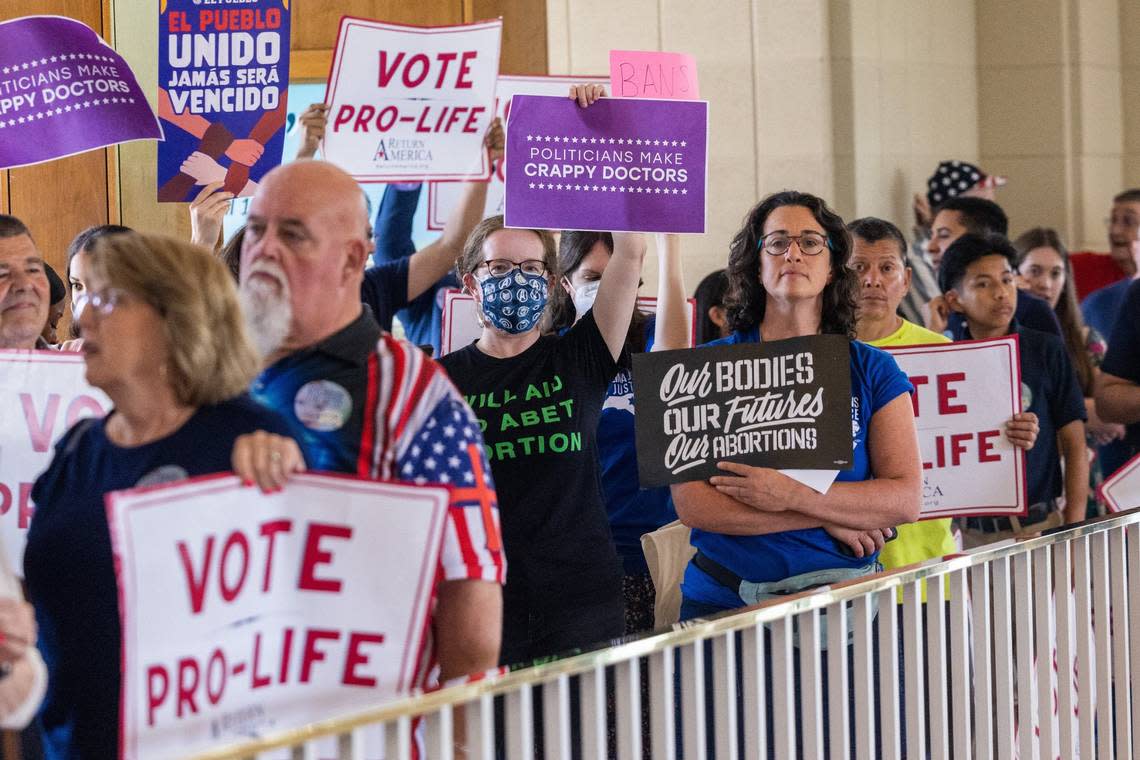NC now bans abortion after 12 weeks. Answers to questions about the new law
New abortion restrictions will be implemented this summer in North Carolina after state lawmakers voted to override Democratic Gov. Roy Cooper’s veto.
The law given final approval by the state House and Senate in May is a first-trimester ban that would block the procedure after 12 weeks of pregnancy. It includes exceptions for pregnancies caused by rape or incest, pregnancies involving certain fetal anomalies, and situations in which the mother’s life is in danger.
It also includes more than $100 million in funding for child care, foster care, and maternity and paternity leave for teachers and state employees.
In response to a lawsuit seeking to block portions of the law from taking effect, the General Assembly passed a package of changes and clarifications in late June, including getting rid of a discrepancy on medication abortions and clarifying such abortions are legal up to 12 weeks.
On June 30, a federal judge ruled that the vast majority of the law could take effect July 1, as the latest changes had made many of the lawsuit’s points moot.
Read on for further details on the new law:
What does the new abortion law in NC change from the current law?
State law currently bans abortions after a gestational age of 20 weeks. Under the new GOP-drafted law, that ban now happens at 12 weeks.
Current law also only provides a narrow exception for medical emergencies.
The new exceptions would allow abortions:
Up to 20 weeks in cases of rape or incest. The law does not require any investigation or law enforcement involvement in these cases.
Up to 24 weeks in cases of fetal “life-limiting” anomalies. The law does not specify a list of anomalies that would qualify and leaves this determination to the physician. Physicians are required to provide information on the anomaly, including the “likelihood of survival and length of survival,” as well as provide referral to perinatal and neonatal care to discuss medical stabilization options, comfort care and more.
Throughout a pregnancy if the mother’s life is in danger. That exception applies only in cases of medical emergencies in which an abortion is deemed necessary to avoid death or a “serious risk of substantial and irreversible physical impairment of a major bodily function.” This does not include psychological or emotional conditions, and it does not apply if the risk of death is due to the pregnant person’s own conduct.
When an abortion is conducted after 12 weeks, physicians will need to record “the findings and analysis” used to deem there was a medical emergency, life-liming anomaly, rape or incest and provide this information to the state’s Department of Health and Human Services. These records will not be subject to public records requests, and it’s the responsibility of the physician to submit the information while omitting identifying patient details. This reporting requirement is in current law, but required after 20 weeks.
‘More people will die’: Triangle doctors reel over proposed 12-week abortion ban
Are there new requirements to get an abortion?
Yes. Women seeking a medication abortion will have to attend two new in-person appointments, one 72 hours before taking the pill and another appointment one to two weeks afterward. This is in addition to another in-person appointment already required when taking the pill.
For the final appointment, the prescribing physician will need to make “all reasonable efforts” to ensure that the woman returns for this appointment and document efforts made to comply with this requirement in the woman’s medical records. Physicians will also have to verify that the “probable gestational age” of the unborn child is no more than 10 weeks. The U.S. Food and Drug Administration approves use of mifepristone and misoprostol up to 10 weeks.
Meanwhile, already in current law, surgical abortions require two in-person appointments, one 72 hours before the procedure and one the day of the procedure, as previously reported by The News & Observer.
The law creates a $5,000 fine for any person or organization who advertises or provides abortion-inducing drugs, such as mifepristone and misoprostol, in violation of the law.
Providers would also be prohibited from conducting an abortion if they believe the pregnant person is seeking an abortion due to the race, sex or presence or presumed presence of Down syndrome in the fetus.
These requirements are in addition to other ones already in place, such as requiring that before an abortion, except in the case of a medical emergency, providers give the pregnant person a “real-time view of the unborn child” and explain what the display is depicting.

Who can perform abortions?
The law requires that any abortions performed in North Carolina after the first trimester be performed in a hospital.
Before the first trimester, abortions could be performed in a hospital, ambulatory surgical center, or clinic certified by the Department of Health and Human Services.
One section of the legislation authorizes the North Carolina Medical Care Commission to “adopt, amend, and repeal all rules necessary for the implementation of this Part.” Planned Parenthood told The N&O this language may mean the commission will have the latitude to rewrite regulations and rules governing abortion clinics in the state, which would be as strict as those governing outpatient surgical centers. Planned Parenthood clinics may not meet new requirements, The N&O reported.
Will providers face any new requirements if they conduct an abortion?
Providers would need to report more information.
For abortions after 12 weeks, physicians would need to report information to DHHS such as the measurements of the fetus and an ultrasound image of the fetus, among other requirements. Under current law, this is required after 16 weeks.
What services does the law provide funding for?
There is more than $180 million in state and federal funds in the GOP abortion law for a range of services including child care and foster care. Republicans said the funds would include:
▪ $75 million in state funds to expand access to child care.
▪ Nearly $59 million in state funds (plus additional federal matching funds) for foster care, kinship care and children’s homes.
▪ $20 million in state funds for maternity and paternity leave for teachers and state employees. This would allow full-time state employees to take off up to eight weeks after giving birth or up to four weeks after becoming a parent.
▪ More than $16 million in state and federal matching funds to address infant and maternal mortality.
▪ $7 million to increase access to reversible contraception for “under-served, uninsured, or medically indigent patients.”
▪ $3 million to help parents complete community college.

Are there new abortion-related criminal penalties?
Yes, the law includes multiple criminal penalties.
One provision legally requires doctors to care for newborns who survive an unsuccessful abortion. Republicans tried to pass such a bill in 2019, but it was vetoed by Gov. Roy Cooper, and while an override vote went through in the Senate, it failed in the House.
Under the new GOP abortion law, physicians who violate that provision could be charged with a Class D felony, and face a $250,000 fine.
The law also increases criminal penalties for assaults on pregnant women, create a misdemeanor crime for domestic violence, and raise GPS monitoring for “certain repeat and violent sexual offenders” from 10 years to lifetime monitoring.
Any physician who violates the new abortion laws can be disciplined by their licensing board, the North Carolina Medical Board. Any other licensed health care provider can face discipline by their respective licensing agency or board.

What happens next?
The new law doesn’t take effect all at once, with most provisions starting July 1, but others implemented Oct. 1 and Dec. 1.
The provisions that take effect July 1 include:
The repeal of the current law, which allows abortions until 20 weeks of gestation, the new 12-week abortion limit, and the associated exceptions.
New informed consent requirements for medical abortions, requiring physicians to provide the pregnant person an abortion consent form at least 72 hours earlier. It must be initialed and signed, disclosing the probable gestational age of the child, the risks of carrying the pregnancy to term and a real-time view of the fetus and heart tone monitoring, among other provisions.
New requirements that physicians providing abortion-inducing drugs must verify the gestational age of the fetus, determine the woman’s blood type and schedule two new in-person appointments, one 72 hours before taking the pill and another appointment one to two weeks afterward. This is in addition to the in-person appointment already required when taking the pill.
New requirements for physicians to report to the state’s Department of Health and Human Services all abortions performed after 12 weeks alongside information such as the demographic and medical history of the woman who had the abortion, whether the woman returned for a follow-up appointment — which the physician must make all efforts to schedule — and more.
Funding provisions, which include $7 million to increase access to reversible contraception, $20 million in state funds for maternity and paternity leave for teachers and state employees and funding for a range of services including child care and foster care.
A prohibition on eugenics abortions.
A provision that creates a $5,000 fine for any person or organization who advertises or provides abortion-inducing drugs, such as mifepristone and misoprostol, in violation of the law.
